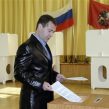
Fissures Appear in the Power Vertical in Moscow
Publication: Eurasia Daily Monitor Volume: 6 Issue: 204
By:

Local government elections held on October 11 in 75 regions of Russia were massively rigged by the authorities in favor of the ruling United Russia party. There is, of course, nothing particularly new about election fraud in Russia –the nation is not a democracy and vote rigging is widespread. By producing the best possible result in favor of United Russia, local authorities demonstrate their loyalty to the supreme national leader Prime Minister Vladimir Putin, who is the chairman of United Russia. What was indeed surprising in the elections last month is that the opposition factions of Communists (KPRF), pro-Kremlin Liberal Democratic Party (LDPR) and Just Russia (SR) staged a walk out in the State Duma, while their leaders angrily protested against the vote rigging (EDM, October 14).
Of course, United Russia has an overwhelming majority in the Duma (314 seats out of 450) and while the opposition factions boycotted the procedures, the chamber continued to rubber-stamp pro-government legislation. KPRF, LDPR and SR are normally very constructive, loyal opposition factions, while their election fraud protest fizzled out after several days and today they are all back in the Duma –presenting to the outside world a seemingly normal face of Russia’s so-called “sovereign democracy.” The Duma opposition leaders were received by President Dmitry Medvedev in the Kremlin and told that they could protest against the election results in the courts if they wish (Interfax, October 24). The Kremlin and United Russia have publicly dismissed election fraud accusations as a hysterical reaction orchestrated by those who cannot accept political defeat.
Clearly, the Russian legal system is totally corrupt and politically controlled by the authorities. Challenging electoral fraud in court is futile. KPRF and the liberal Yabloko party have frequently been unsuccessful in challenging election results in court. It is clear that the fraudulent election results on October 11 will stand, but the political aftershocks continue as more factual evidence of the magnitude of the vote rigging is exposed. The results of an opinion poll held after the election in Moscow by the independent Levada Center on October 22-27 show that the real turnout was about 23 percent, while official results claim a 31 percent turnout. Officially, United Russia secured 66.25 percent of the vote, but the poll gave them only 46.1 percent. The Levada Center report concluded that only in Moscow were ballot boxes stuffed by “hundreds of thousands” of fraudulent votes. These fake votes (the difference between the actual turnout of 23 percent and the reported turnout of 31 percent) –almost a million votes in Moscow– were given by the authorities to United Russia, giving it 20 percent more votes. The Levada Center results corroborate the findings of a similar pole organized by KPRF (Vedomosti, November 3).
The rigging of the October 11 election has caused a slight decrease in the approval ratings of Medvedev and Putin, as reported by two polling services –Levada Center and the Foundation of Public Opinion. Of course, the fluctuation is not significant (Medvedev’s approval decreased from 62 to 56 percent and Putin’s from 72 to 66 percent). This decline was dismissed by the Kremlin as a statistical error (Vedomosti, November 2). What is probably more important, are the continuing rifts the October election is causing within the ruling elites.
After meeting Medvedev on October 24 to complain about election fraud, the leader of the pro-Kremlin LDPR Vladimir Zhirinovsky publicly accused the Moscow Mayor and United Russia kingpin Yury Luzkov of “ruling in Moscow for 20 years, creating the most corrupt local government in Russia and rigging elections.” Zhirinovsky demanded Luzkov’s dismissal and the appointment of a government minister by Medvedev to directly rule Moscow and its region. Zhirinovsky’s invective was reported by the closely censured Russian state television. A source in the Moscow government told journalists that the attack on Luzkov was approved by the Kremlin despite “Zhirinovsky and Luzkov having good personal relations.” A recent poll by the Levada Center shows that 61.4 percent of Russians believe Luzkov is indeed corrupt (Vedomosti, October 27).
The Russian nation may believe its leaders are crooks, but the public remains mostly passive. On October 31 another attempt at peaceful public protest by human rights activists in Moscow was violently dispersed by the riot police OMON units, while a “Russian march” by extreme nationalists was allowed to proceed on November 4. In both events, the number of participants was limited (Interfax, November 4). However, the authorities are not taking any chances. Last week, during an international police exhibition, Interpolitekh 2009, in the outskirts of Moscow, the riot police OMON held public exercises using a water cannon, teargas and shock grenades “to assault a social protest by impoverished senior citizens (pensioners),” as the event was described in a press release given to journalists. Later the interior ministry announced that reporters had distorted the facts –the OMON “attack” was aimed at “socially disturbed citizens,” but not “pensioners” specifically. It was reported that an interior ministry junior official as well as an Interfax reporter were punished for this alleged misreporting (Vedomosti, Kommersant, October 30).
The KPRF leader Gennady Zuganov has announced that the communists will stop being a “loyal opposition” and instead begin a campaign to demand the resignation of Putin and his government, while supporting Medvedev. Zuganov conceded that Medvedev’s public criticism last week of communist terror during the rule of Josef Stalin in the 1930’s and 1940’s “was disturbing,” while Putin’s known support of Stalinism was acceptable. But still, the KPRF wanted to side with Medvedev to exploit the presumed differences between him and Putin (Vedomosti, Kommersant, November 2). The masses may still be passive, but the growing tension within the elite is unnerving.




